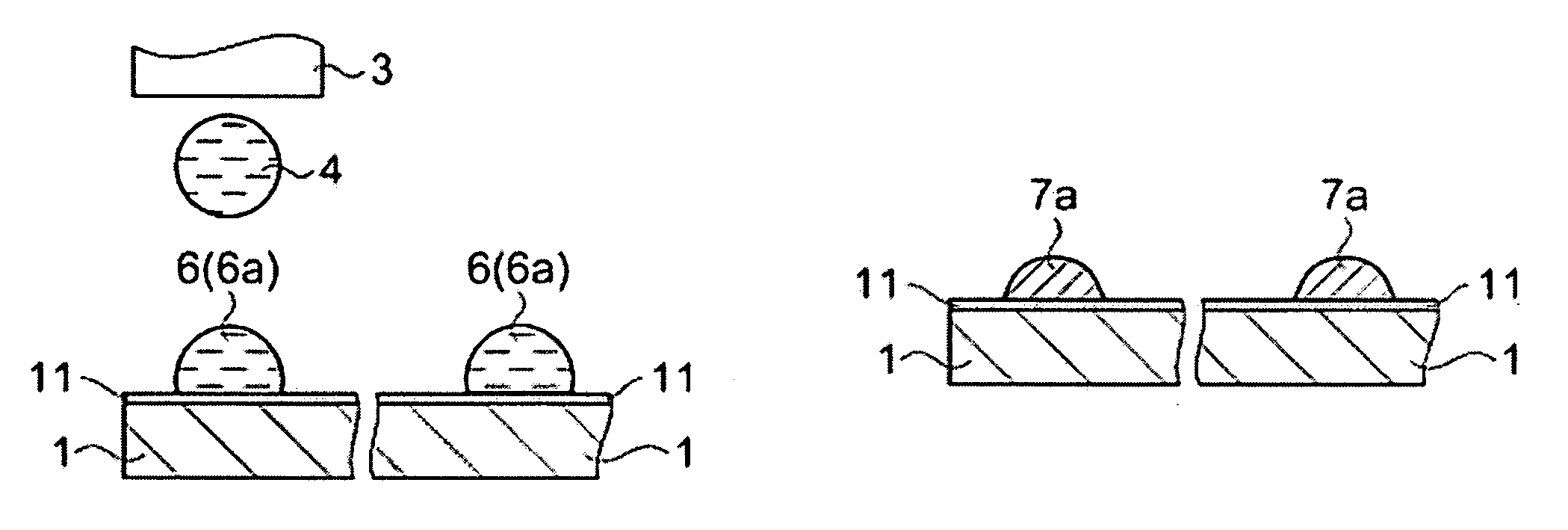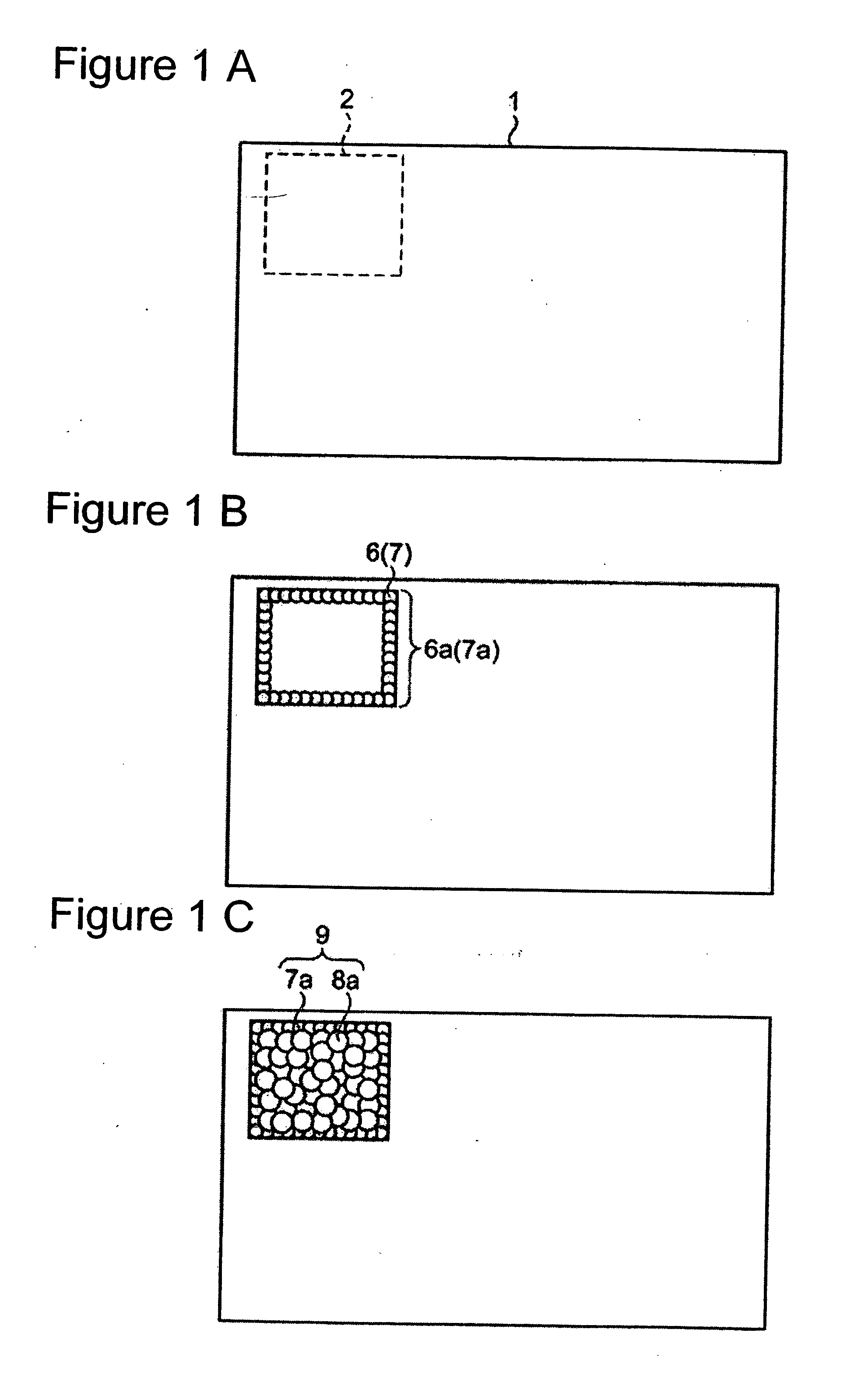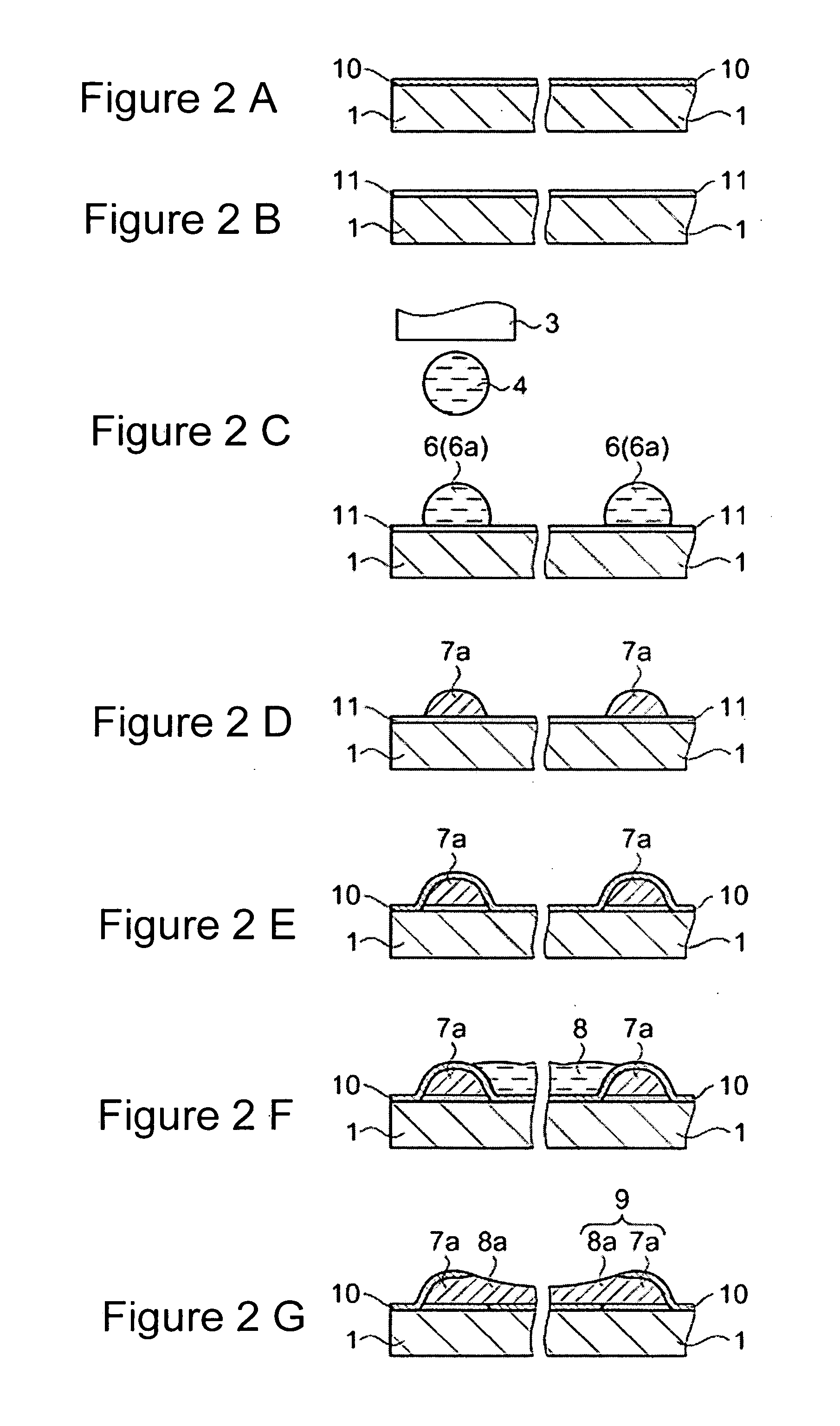Film pattern forming method, film pattern, resist film, insulation film, circuit board, semiconductor device, surface elastic wave device, surface elastic wave oscillation device, electro-optic device, and electronic device
a film pattern and film pattern technology, applied in the direction of printed circuit manufacturing, printed circuit aspects, semiconductor devices, etc., can solve the problems of increasing the surface area necessary to form the film pattern, the droplet shape cannot be maintained, and the droplet wet-spreading of the margin part of the margin area is difficult to achieve, so as to reduce the outward direction of wet-spreading of the droplet, the effect of increasing the thickness and reducing the flow
- Summary
- Abstract
- Description
- Claims
- Application Information
AI Technical Summary
Benefits of technology
Problems solved by technology
Method used
Image
Examples
first embodiment
[0098]FIG. 1 is a schematic plan view showing the film pattern forming method of the FIG. 2 is a schematic cross section view showing the film pattern forming method of the present embodiment. A substrate 1 shown in FIG. 1 is a liquid crystal substrate of, for example, a surface elastic wave device. An example is described wherein a resist film 9 is formed in a region 2 indicated by the dashed lines in FIG. 1A. Region 2 corresponds to a margin area, and a resist film 9 corresponds to a resist film and film pattern.
[0099] First, the surface of the substrate 1 is subjected to a lyophilic process to form a lyophilic film 10 on the surface including the region 2, as shown in FIG. 2A. Then, the surface of the substrate 1 is subjected to a liquid repellency process to mitigate lyophilic property of the lyophilic film 10 and form a liquid-repelling film 11, as shown in FIG. 2B. The thickness of the lyophilic film 10 and liquid-repelling film 11 is approximately a one-molecule layer. Next,...
second embodiment
[0184] The second embodiment provides the following effects.
[0185] (1) Droplets of applied liquid etching resist material are prevented from flowing from the electrode forming region and wetting outside the electrode forming region by forming an etching resist film in a predetermined electrode shape and thickness. Accordingly, electrodes such as the IDT 55, reflectors 56a and 56b, and connecting lands 57a and 57b can be formed in precise shapes.
[0186] (2) Applied liquid anodic oxidation resist film material is prevented from flowing outside the connecting lands 57a and 57b forming regions and wetting outside the regions by forming an anodic oxidation resist film of sufficient thickness and accurately covering the connecting lands 57a and 57b. Accordingly, the anodic oxidation resist film covering the connecting lands 57a and 57b can be formed at the connecting lands 57a and 57b without covering the IDT 55 that requires the anodic oxidation process.
[0187] (3) Applied liquid anodic ...
third embodiment
[0206] The third embodiment provides the following effects.
[0207] (1) The liquid insulation film material for forming the fill-in part 91 is prevented from flowing through the through hole 86 by the formation of the hole margin 88. Accordingly, it is possible to form the insulation film directly next to the through hole 86, and the insulation film 92 for covering the circuit lead 83 can be formed without covering the mutually adjacent through hole 86 and through hole 86 in the circuit lead 83.
[0208] (2) The liquid insulation film material for forming the fill-in part 91 is prevented from covering the land 84a by forming the land margin 87. Accordingly, it is possible to form the insulation film directly next to the land 84a, and the insulation film 92 for covering the circuit lead 83 can be formed without covering the mutually adjacent land 84a and land 84a in the circuit lead 83.
[0209] (3) The liquid repellency process is performed before the droplets of liquid insulation materia...
PUM
| Property | Measurement | Unit |
|---|---|---|
| Contact angle | aaaaa | aaaaa |
| Contact angle | aaaaa | aaaaa |
| Viscosity | aaaaa | aaaaa |
Abstract
Description
Claims
Application Information
 Login to View More
Login to View More - R&D
- Intellectual Property
- Life Sciences
- Materials
- Tech Scout
- Unparalleled Data Quality
- Higher Quality Content
- 60% Fewer Hallucinations
Browse by: Latest US Patents, China's latest patents, Technical Efficacy Thesaurus, Application Domain, Technology Topic, Popular Technical Reports.
© 2025 PatSnap. All rights reserved.Legal|Privacy policy|Modern Slavery Act Transparency Statement|Sitemap|About US| Contact US: help@patsnap.com



